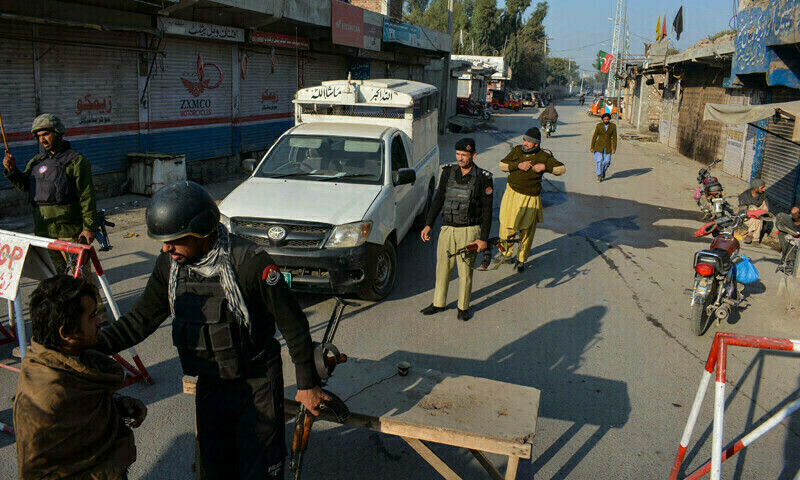By Ghulam Haider Shaikh

The tragic attack on a police check post in Bannu, resulting in the martyrdom of a police officer and the death of three terrorists, is a sobering reminder that the menace of terrorism is far from over. While Pakistan has made commendable strides in dismantling terrorist networks and reclaiming territories once held by extremists, incidents like this demonstrate that scattered elements of militancy remain dangerously active, especially in regions close to the tribal belt and the Afghan border.
The security forces deserve praise for their swift and decisive response that neutralized the threat before it could cause greater devastation. Yet, every life lost in the line of duty carries the weight of a nation’s ongoing struggle. The martyrdom of a police officer is not just a personal tragedy for his family, but a national sacrifice made in the defense of peace, order, and civil society. These brave men continue to guard Pakistan’s frontlines at great personal risk, ensuring that citizens can carry on with their daily lives in safety.
This attack must prompt serious reflection at both provincial and national levels. First, there is a pressing need to evaluate whether our intelligence coordination, especially in volatile districts like Bannu, is sufficiently proactive. Has there been a lapse in threat monitoring? Were there early warning signs that went unheeded? These are questions the authorities must ask, not for blame, but for the strengthening of security protocols and the prevention of future attacks.
Second it is vital that the provincial government ensures consistent and unwavering political support for law enforcement agencies operating in high-risk areas like Bannu and other parts of Khyber Pakhtunkhwa. These agencies are not merely administrative bodies but form the frontline of the nation’s defense against a persistent and evolving terrorist threat. Without clear and committed political backing, the efforts of police and counterterrorism forces can become directionless and demoralized. It is not enough to issue statements of condemnation after an attack, what is needed is a structural commitment that includes robust policymaking, legislative empowerment, and sustained resource allocation.
Police morale and operational readiness cannot be taken for granted, especially when facing a well-armed and ideologically motivated enemy. Officers risking their lives daily must feel that the state stands behind them, not just symbolically, but practically. This means competitive salaries, psychological support systems, and recognition for bravery, as well as continuous and advanced training to stay ahead of terrorist tactics.
Furthermore, modern policing now demands access to sophisticated technology, including surveillance drones, forensic labs, cyber-monitoring tools, and real-time intelligence-sharing networks. These investments are not luxuries, they are necessities in a province where militants have frequently regrouped and launched attacks.
In this regard, Khyber Pakhtunkhwa, often the first target of such orchestrated violence — must be treated as a high-priority security zone requiring special administrative focus, dedicated development packages, and consistent federal cooperation. Only by addressing both the logistical needs of the security apparatus and the socio-political roots of unrest can the state hope to secure lasting peace in this deeply vulnerable region.
The regional implications cannot be ignored either. Cross-border terrorist movements, safe havens in inaccessible terrains, and external ideological influences have long complicated Pakistan’s counterterrorism efforts. If the Bannu incident has any links to such external networks, the government must raise the matter diplomatically and through regional forums. No nation can afford to ignore threats spilling across borders in today’s interconnected security environment.
Public solidarity is equally important in these moments. Citizens must stand firm in rejecting all forms of extremism and must support their security agencies in the battle to uphold law and order. The state, in return, must fulfill its responsibility of not only punishing perpetrators swiftly and transparently but also safeguarding its frontline warriors with dignity and respect.
Ultimately, the fight against terrorism is not only being waged in the mountains or at check posts, it is also fought in classrooms, communities, and courtrooms. We must collectively challenge the mindsets that justify violence and the silence that enables radicalism. The blood spilled in Bannu should become a call to conscience for every segment of Pakistani society.
Let us honor the martyred officer not just with words of tribute, but through firm resolve — a promise that his sacrifice will not be forgotten, and that those responsible will face justice. Pakistan cannot afford to lose its hard-won gains in security. Each such incident should serve as both a warning and a rallying cry: the fight continues, and we must remain vigilant.

